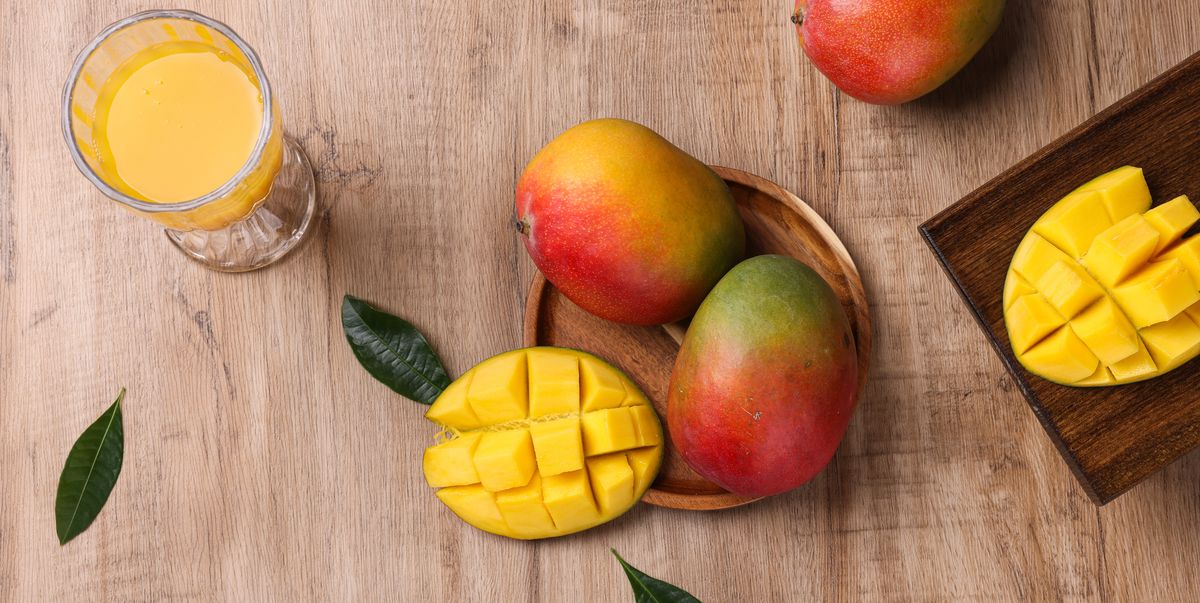Nothing says summer like peeling off the skin of a perfectly ripe mango and digging in. And the benefits of mango expand beyond that simple, seasonal joy. Like many fruits, mangoes are rich with nutrients that join forces to provide hydration, protective antioxidants, gut-loving fiber, and more.
Meet the experts: Avery Zenker, R.D., a dietitian at MyHealthTeam; and Jennifer Pallian, B.S.C., R.D., a registered dietitian at Foodess
Below, experts detail the exact unique benefits of mangoes, and share their favorite ways to enjoy the tropical treat.
Mango nutrition
According to the United States Department of Agriculture, 100 grams (g) or around 3.5-ounces of peeled, raw mango roughly breaks down nutritionally as follows:
- Calories: 68
- Protein: 0.6 grams (g)
- Carbs: 15 g
- Fiber: 2 g
- Sugar: 11 g
- Calcium: 12 milligrams (mg)
- Magnesium: 10 mg
- Potassium: 165 mg
- Vitamin C: 25.5 mg
One cup of sliced mango (or 165 g) provides approximately 60% of the daily recommended value (DV) of vitamin C, 10% of the DV of vitamin A, 18% of the DV of folate, and a half-cup of water for hydration, says Avery Zenker, R.D., a dietitian at MyHealthTeam. Mangoes are also low in sodium, fat, and free of cholesterol and trans fats.
Mango benefits
While eating mango alone won’t result in massive health change, the potential perks of including the fruit as part of a well-rounded diet include:
1. They are rich in vitamin C.
Mangoes are high in vitamin C, which can boost immunity and aid in iron absorption, says Jennifer Pallian, B.S.C., R.D., a registered dietitian at Foodess. Vitamin C is also important for collagen synthesis, protein metabolism, and overall protective work throughout the body in conjunction with other antioxidants.
2. They could support digestion and gut health.
Fiber is important for digestion and satiety, explains Pallian, and mangoes contain a decent amount in a single fruit. They also have enzymes like amylase, which aids in breaking down food and waste for digestion, Zenker explains. A small 2022 study (supported by the National Mango Board) found that mangoes may also contribute to gut microbiome diversity.
3. They may help protect against chronic and age-related disease.
Mangoes contain polyphenols, “which are a class of compounds found in plants that have health benefits,” explains Zenker. These antioxidants are anti-inflammatory, and inflammation is linked to chronic diseases including heart disease, some cancers, and neurodegenerative diseases like Alzheimer’s. There is increasing evidence that mangiferin, a polyphenol specific to mangoes, may play a particular role in disease prevention.
4. They’re hydrating and potentially blood pressure-friendly.
Mangoes are full of water, which is why they hit the spot on a hot summer day. Their potassium can aid in hydration and, bonus, may help maintain healthy blood pressure levels, says Zenker. (Talk to your doctor if you’re concerned about high blood pressure.) “Their combination of potassium, sugar, and water, can make them a great part of a post-exercise snack,” she adds.
5. They provide important vitamins and minerals.
Mangoes contain copper and folate for vascular and nervous system health, explains Pallian. Copper is involved in energy production, iron metabolism, brain health, and keeping your connective tissues strong. Your body needs folate to make DNA and help your cells divide.
6. They can support eye health.
It’s not just carrots that contain beta-carotene and lutein, the nutrients that can help keep your peepers sharp by preventing disease like macular degeneration. Mangoes have a good amount, too.
Mango risks
Mangoes are high in natural sugars, so overconsumption may cause blood sugar spikes, says Pallian, especially in people with diabetes. A mango allergy—though rare—can cause mild to severe reactions, and can be more common when cross-reactivated with allergens like poison ivy, birch pollen, pistachio, or latex, she adds. Talk to your doctor before making any dietary changes, especially if you have diabetes or food allergies.
How to enjoy mango
“There are many healthy ways to enjoy mangoes that preserve their nutritional value,” says Pallian. Here are a few dietitian-approved favorites.
Mango chia pudding
Recommended by Pallian, this is a good breakfast choice that combines milk, chia seeds, and mango for a filling, fiber-rich, and antioxidant-packed meal.
Homemade sauces
Pallian says homemade sauces like mango habanero “offer a sweet and spicy flavor boost without processed additives and can be served with tacos, shrimp, and grilled fish.”
Smoothies or soft-serve
“Mangoes add a sweet tropical taste and smooth texture to smoothies. They pair well with bananas, berries, coconut milk, spinach, and other common smoothie ingredients,” says Zenker, like protein powder. Or you can make them into dessert soft-serve by blending them, frozen, with milk.
Salad
“Mangoes can also be part of balanced salads that include avocado, chicken, and whole grains, combining healthy fats, proteins, and fiber,” says Pallian. In the same vein, they also make a great pico de gallo or salsa ingredient.
Related Stories
